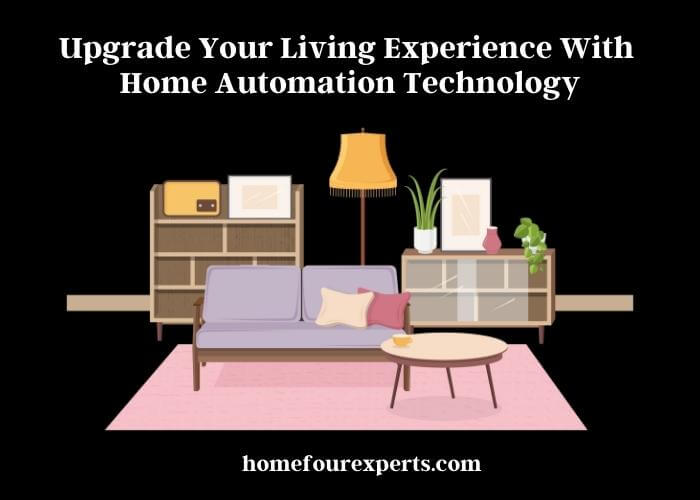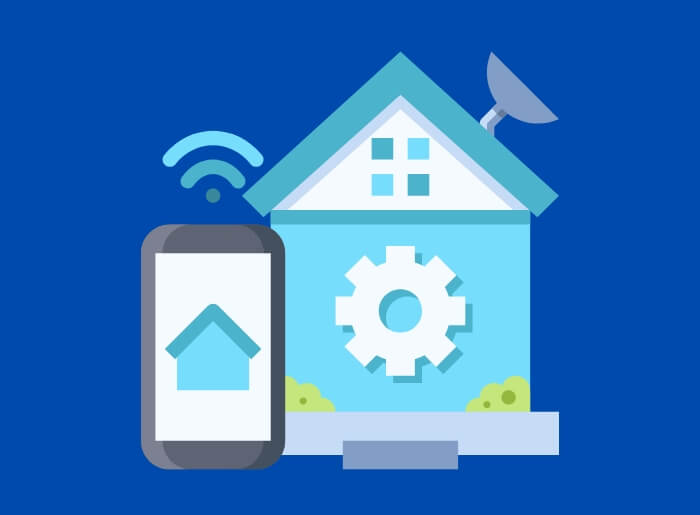Home automation has become increasingly popular in recent years, with advancements in technology making it easier than ever to control and monitor your home from anywhere. With just a few taps on your smartphone, you can adjust your home’s temperature, turn off the lights, and even lock your doors. But what exactly is home automation, and why has it become such a hot topic?

We’ll explore the world of home automation, from the different types of smart devices available to the benefits and challenges of integrating them into your home. Whether you’re a tech enthusiast or simply looking for ways to make your life easier, this guide will provide you with everything you need to know about home automation. So, let’s dive in and discover the exciting possibilities that await you!
What is Home Automation?
Home automation refers to the use of technology to control and automate various household tasks and appliances. With home automation, you can use your smartphone or another internet-enabled device to control and monitor your home’s lighting, temperature, security, entertainment systems, and more.
Home automation systems typically involve the use of devices such as sensors, cameras, and smart appliances that are connected to a network and can be controlled remotely through a central hub or app. This allows you to easily adjust settings and monitor your home’s energy usage, security, and other factors from anywhere, whether you’re at work or on vacation.
The benefits of home automation include increased convenience, improved energy efficiency, enhanced security, and even cost savings over time. By automating routine tasks and monitoring your home’s systems, you can free up time and energy for other activities, while also reducing your carbon footprint and enhancing the safety and security of your home.
Whether you’re a tech enthusiast or simply looking for ways to make your life easier, home automation has something to offer.
Types of Home Automation
There are various types of home automation systems available on the market today, each designed to automate different tasks and improve the functionality and convenience of your home. Here are some of the most popular types of home automation:
Smart Lighting: With smart lighting systems, you can control your home’s lighting from anywhere, using your smartphone or another internet-enabled device. Smart lighting systems typically use LED bulbs that can be dimmed, adjusted for color temperature, and programmed to turn on and off according to your preferences.
Smart Thermostats: Smart thermostats allow you to control your home’s temperature remotely, adjust settings based on your schedule, and monitor your energy usage. They can also learn your preferences over time and automatically adjust the temperature to maximize comfort and efficiency.
Smart Security: Smart security systems can include cameras, motion sensors, and door locks that can be monitored and controlled remotely. You can receive alerts on your smartphone if there’s any unusual activity detected in or around your home, and you can even lock or unlock doors and windows from afar.
Smart Appliances: Smart appliances include everything from smart refrigerators and ovens to smart washing machines and dryers. With these appliances, you can monitor and control your usage, receive alerts when maintenance is required, and even program them to start cooking or cleaning at specific times.
Smart Entertainment: Smart entertainment systems allow you to control your TV, speakers, and other devices with a single remote or app. You can stream movies, music, and other content from your favorite platforms and adjust the volume, lighting, and other settings to create the perfect ambiance.
These are just a few examples of the many types of home automation systems available. Whether you’re looking to improve your home’s functionality, enhance its security, or simply make your life easier, there’s sure to be a home automation solution that’s right for you.
Benefits of Home Automation
Home automation offers a wide range of benefits for homeowners, including increased convenience, energy efficiency, security, cost savings, and even increased home value. Here are some of the key benefits of home automation:
Convenience
Home automation allows you to control and monitor your home’s systems and appliances from anywhere, using your smartphone or another internet-enabled device. This means you can adjust your thermostat, turn off lights, and even lock your doors without having to be physically present in your home.
Energy Efficiency
Home automation can help you save money on your energy bills by allowing you to monitor and control your energy usage. For example, you can program your thermostat to adjust the temperature based on your schedule, or turn off lights and appliances when they’re not in use.
Security
With home automation, you can monitor your home’s security systems remotely, and receive alerts if there’s any unusual activity detected. You can also lock or unlock doors and windows from afar, and even view live video footage of your home’s interior and exterior.
Cost Savings
While home automation systems can be an upfront investment, they can also help you save money in the long run by reducing your energy bills and preventing costly repairs. For example, a smart thermostat can help you save up to 15% on your heating and cooling costs.
Increased Home Value
Home automation systems can also increase the value of your home, making it more attractive to potential buyers. This is particularly true for systems that are energy-efficient, secure, and easy to use.
Home automation can help you save time, money, and energy, while also providing greater convenience, security, and comfort. Whether you’re looking to improve your home’s functionality or increase its value, home automation is a smart investment.
How Home Automation Works?
Home automation systems work by using a combination of sensors, smart devices, and a central hub or control system to automate various tasks and functions in your home.

Home automation systems typically use sensors to detect changes in the environment, such as motion, light, temperature, or humidity. These sensors can be installed throughout your home, and are often wireless and battery-powered for easy installation and maintenance.
Once a change is detected by a sensor, the home automation system will use a smart device to respond to that change. For example, a motion sensor might trigger a smart light bulb to turn on, or a change in temperature might prompt a smart thermostat to adjust the heating or cooling.
The smart devices in your home are connected to a central hub or control system, which allows you to monitor and control them from a single location. This might be a mobile app on your smartphone or tablet or a dedicated control panel in your home.
To fully automate your home, you can program your devices and sensors to respond to specific triggers or events. For example, you might program your smart lights to turn on automatically when you enter a room, or your smart thermostat to adjust the temperature when you leave for work in the morning.
Many home automation systems also offer remote access, which allows you to monitor and control your home’s systems and appliances from anywhere, using your smartphone or other internet-enabled devices.
Home automation systems work by combining sensors, smart devices, and a central control system to automate tasks and functions in your home, and make your life easier and more convenient. With the right system in place, you can enjoy greater energy efficiency, security, and comfort, while also saving time and money on routine tasks and maintenance.
Popular Home Automation Brands
There are many home automation brands on the market today, each offering its own unique set of features and capabilities. Here are some of the most popular home automation brands, along with a brief overview of what they offer:
- Nest: Nest is a popular home automation brand that offers a range of smart devices, including thermostats, security cameras, and smoke alarms. Nest devices are known for their sleek design and user-friendly interface, and they integrate with a wide range of other smart home devices and platforms.
- Philips Hue: Philips Hue is a brand that specializes in smart lighting solutions. Their line of smart light bulbs can be controlled using a mobile app and can be customized to create a variety of different lighting scenes and moods.
- August: August is a brand that offers a range of smart locks and doorbells, allowing you to control access to your home from anywhere. August devices integrate with a wide range of other smart home devices and platforms and offer advanced features like remote access and activity monitoring.
- Samsung SmartThings: Samsung SmartThings is a home automation platform that allows you to connect and control a wide range of different devices and systems, including lighting, thermostats, security cameras, and more. SmartThings devices are compatible with a wide range of other smart home devices and platforms and offer powerful automation and customization capabilities.
- Ecobee: Ecobee is a brand that specializes in smart thermostats, offering advanced features like room-specific temperature control and energy usage monitoring. Ecobee devices are known for their user-friendly interface and energy-saving capabilities.
These are just a few of the many home automation brands on the market today. When choosing a brand or system for your home, it’s important to consider your specific needs and priorities and to choose a system that offers the features and capabilities that are most important to you.
What are the Challenges of Home Automation?
Home automation has the potential to offer many benefits, including improved energy efficiency, convenience, and security. There are also several challenges that come with implementing a home automation system. One of the most significant challenges is the high cost of installation and maintenance, as well as the ongoing costs of purchasing and upgrading smart devices and systems.
Another challenge is compatibility, as not all devices and systems may be compatible with one another. This can make it difficult to create a fully integrated home automation system. Home automation systems can also be complex to set up and use, which may require some technical expertise or professional help. Reliability can be an issue, with potential glitches or malfunctions that can cause frustration and potentially even danger.
There are security vulnerabilities to consider, as home automation systems can be vulnerable to hacking and cyber-attacks. It’s important to be aware of these challenges and to take steps to mitigate them when implementing a home automation system.
Future of Home Automation
The future of home automation looks bright, with continued advances in technology and increasing demand for smart home solutions. Some of the key trends shaping the future of home automation include the integration of artificial intelligence and machine learning, the proliferation of voice-controlled devices, and the continued growth of the Internet of Things (IoT). As more and more devices and systems become connected and intelligent, we can expect to see even greater levels of energy efficiency, convenience, and personalization in our homes.
As concerns around sustainability and climate change continue to grow, home automation systems are likely to play an increasingly important role in helping us reduce our environmental footprint and live more sustainable lives.
The future of home automation promises to be exciting and transformative, offering a range of benefits and opportunities for homeowners and society as a whole.
Wrap Up
Home automation has the potential to transform the way we live, offering greater levels of energy efficiency, convenience, and personalization in our homes. While there are certainly challenges and drawbacks to consider, the benefits of home automation are significant and growing, with continued advances in technology and increasing demand for smart home solutions.
Whether you’re looking to improve your home security, reduce your energy bills, or simply make your life a little easier, there’s likely a home automation solution out there that can help you achieve your goals. As we look to the future, it’s clear that home automation will continue to play an increasingly important role in our lives, helping us live more connected, sustainable, and comfortable lives.
About This Writer

Hi, I am Eric Devin and I am a professional interior architect. Since childhood, I've always enjoyed DIY projects! And, I have loved to solve simple household problems using essential tools and equipment. I have also acquired a lot of information about basic household tools settings by working with contractors.